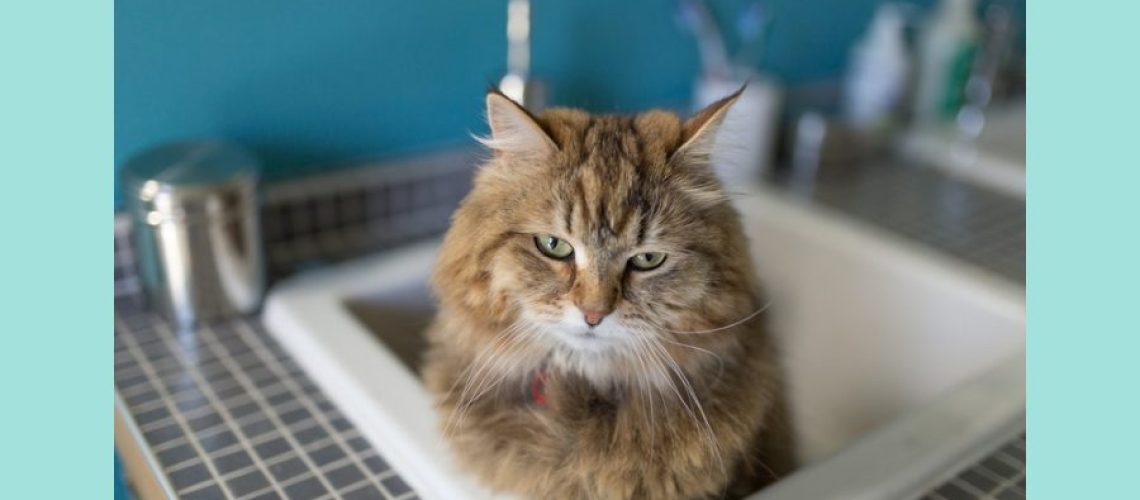Attention all cat owners! Are you tired of finding surprises in your sink? Well, get ready to uncover the secrets behind why cats choose this peculiar spot to do their business. Not only will understanding this topic save you from unpleasant surprises, but it will also help you establish a harmonious coexistence with your feline friend. Join us as we dive into the fascinating world of sink surprises and discover effective strategies to prevent them. Get ready to say goodbye to those unexpected encounters and hello to a clean and odor-free bathroom. Let's embark on this journey together and put an end to sink surprises once and for all!
Key Takeaways:
- Cats may poop outside of their litter box due to various reasons, including medical issues, stress, or territorial marking.
- It is important to rule out any underlying medical conditions by taking the cat to a veterinarian before addressing the behavioral aspect.
- Providing multiple clean litter boxes in different locations can help prevent cats from pooping outside of their designated area.
- Creating a calm and stress-free environment for the cat by minimizing changes and providing plenty of mental and physical stimulation can discourage inappropriate elimination.
- Using positive reinforcement techniques, such as rewarding the cat for using the litter box correctly, can be effective in retraining them to use it consistently.
Surprising Reasons Why Cats Choose to Poop in the Sink
Unusual Preferences of Cats
Have you ever wondered why your cat seems to prefer pooping in the sink instead of their litter box? Well, it turns out that cats can have some pretty unique preferences when it comes to their bathroom habits. While most cats are perfectly happy using a litter box, some may develop a preference for the sink. This could be due to a variety of factors, such as the texture of the sink surface or even the height and accessibility of the sink.
Curiosity and Exploration
Cats are naturally curious creatures, and they love exploring new places. The sink provides an interesting and elevated vantage point for them to observe their surroundings while taking care of their business. Additionally, cats have a keen sense of smell, and they may be attracted to certain scents or odors that linger in the sink. So, while it may seem strange to us humans, for a cat, pooping in the sink can be an exciting adventure!
Determining if Your Sink is Becoming a Favorite Spot for Your Cat's Bathroom Needs
Signs Your Cat is Using the Sink as a Litter Box
- Finding feces or urine in your sink on multiple occasions.
- Noticing your cat spending more time near or on the sink.
- Seeing evidence of digging behavior in or around the sink area.
- Observing your cat showing signs of discomfort or dissatisfaction with their current litter box setup.
The Importance of Identifying this Behavior
If you suspect that your cat is using the sink as their personal bathroom spot, it's crucial to address the issue promptly. Not only can this behavior be unhygienic and unpleasant for you, but it may also indicate underlying issues with your cat's litter box or health. By identifying the problem early on, you can take steps to discourage this behavior and ensure your cat has a suitable place to do their business.
Simple Steps to Discourage Your Cat from Using the Sink as a Litter Box
1. Clean and Disinfect the Sink Thoroughly
To discourage your cat from using the sink as a litter box, start by thoroughly cleaning and disinfecting the sink. Cats are sensitive to smells, so removing any lingering odors will help deter them from returning to the sink.
2. Make the Sink Less Accessible
If possible, make it difficult for your cat to access the sink by blocking it off with a barrier or placing objects in the way that discourage jumping onto the sink surface. This will help redirect their attention to their designated litter box area.
3. Provide an Appealing Alternative
Make sure your cat's litter box is clean, easily accessible, and appealing to them. Experiment with different types of litter and litter box designs to find what works best for your feline friend. Additionally, consider placing their litter box in a quiet and private area where they feel comfortable doing their business.
Why Cats Prefer the Sink Over Their Litter Box
Sink vs. Litter Box: The Texture Factor
Cats have sensitive paws, and they may have specific preferences when it comes to textures they encounter while eliminating waste. Some cats may find the smooth surface of a sink more comfortable than stepping into a litter box filled with certain types of litter.
Height and Accessibility
Sinks are often elevated, providing cats with a sense of security and a better view of their surroundings. Additionally, if your cat has any mobility issues or is getting older, they may find it easier to access the sink compared to a litter box that has high sides.
Potential Health Risks of Cats Pooping in the Sink
Spread of Bacteria and Disease
Allowing your cat to use the sink as a litter box can pose health risks for both you and your feline companion. Feces and urine contain bacteria that can contaminate surfaces and potentially cause illnesses. It's important to maintain proper hygiene by regularly cleaning and disinfecting the sink if this behavior occurs.
Underlying Medical Issues
If your cat suddenly starts using the sink instead of their litter box, it could be a sign of an underlying medical issue. Conditions such as urinary tract infections or digestive problems can cause discomfort during elimination, leading cats to seek alternative places to relieve themselves. If you notice any changes in your cat's bathroom habits, it's essential to consult with a veterinarian for proper diagnosis and treatment.
Making Your Cat's Litter Box More Appealing and Encouraging Proper Use
Keep it Clean
Cats are clean animals by nature, so keeping their litter box clean is essential for encouraging proper use. Scoop out waste daily and change the litter frequently to maintain cleanliness.
Choose the Right Litter
Cats have individual preferences when it comes to litter types. Experiment with different textures (clumping vs. non-clumping) and materials (such as clay or recycled paper) until you find one that your cat likes.
Provide Multiple Litter Boxes
If you have multiple cats, ensure that each cat has their own litter box. Cats are territorial animals and may feel stressed or threatened if they have to share a litter box with other cats.
How Changes in Diet Can Affect a Cat's Bathroom Habits and Prevent Sink Usage
Gradual Diet Transitions
Sudden changes in a cat's diet can lead to digestive upset, which may result in changes in bathroom habits. When introducing new foods or transitioning to a different diet, do it gradually over several days to minimize any potential disruptions.
Proper Hydration
Adequate hydration is essential for maintaining healthy bowel movements. Ensure your cat always has access to fresh water and consider incorporating wet food into their diet, as it contains higher water content compared to dry kibble.
Fiber-Rich Foods
Incorporating fiber-rich foods into your cat's diet can help promote regular bowel movements and prevent constipation. Consult with your veterinarian about appropriate sources of dietary fiber for your cat.
In conclusion, cats may choose to poop in the sink due to various reasons such as accessibility and privacy. To prevent this behavior, it is important to keep the litter box clean and easily accessible for your cat.
Why has my cat started pooping in the sink?
There are several potential reasons why your cat may be defecating outside of the litter box, including health issues, stress, an unpleasant odor in the litter box, the location of the litter box, changes in the household, or the introduction of a new family member.
How do I stop my cat from pooping everywhere?
Cats have a heightened sensitivity to certain smells, and there are a few scents that they strongly dislike, which you may be surprised to find in your kitchen. These include orange and lemon peels, cayenne pepper, coffee grounds, lavender oil, lemon grass oil, citronella oil, peppermint oil, eucalyptus oil, and mustard oil.
Should I give my cat water from the sink?
Nevertheless, certain veterinarians recommend against providing cats and dogs with untreated tap water. This is not primarily due to the presence of minerals. Instead, holistic veterinarians argue that pets should avoid consuming chemicals such as chlorine and fluoride that are added by municipalities during the water treatment process.
Why is my cat pooping in the house all of a sudden?
If your cat usually uses the bathroom outside but is now going inside, there could be a reason why they don't want to go outside anymore. It's possible that something scared them, like another cat in the neighborhood, or the weather might be unpleasant and they prefer to stay indoors.
Is there a scent that repels cats?
Herb rue, in either planted or dry form, can be used as a scent repellent. Other options include orange and lemon peels (cats do not like citrus smells), cayenne pepper, coffee grounds, pipe tobacco, lavender oil, lemon grass oil, citronella oil, peppermint oil, eucalyptus oil, and mustard oil.
What is the most effective cat deterrent?
Scents such as citrus or lemon (from orange peels or lemon peels), as well as garlic, ammonia, vinegar, coffee grounds, pipe tobacco, mustard, citronella, and eucalyptus, can all discourage cats. However, the effectiveness of these scents diminishes over time, so they need to be reapplied. Another option is motion-activated sprinklers, which release a short burst of water when triggered by motion.
















